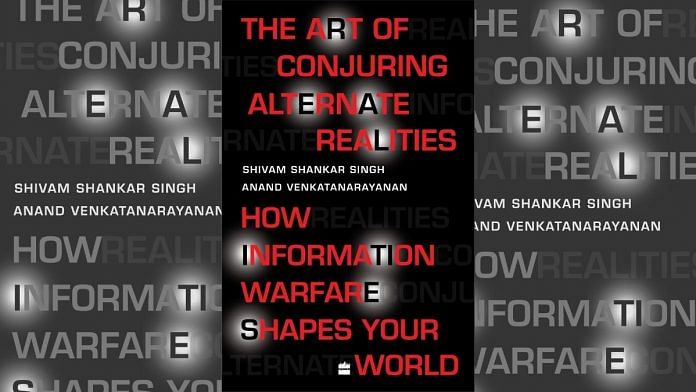
New Delhi: How do politicians in today’s world attain power? How do nations become powerful? Why do human beings follow others unquestioningly, even if it is to their own detriment? What factors determine which politicians, nations, and organisations will dominate the modern world?
In ‘The Art of Conjuring Alternate Realities’, Shivam Shankar Singh and Anand Venkatanarayanan take a deep dive into the operations of political parties, cybercriminals, godmen, nation-states and intelligence agencies from around the world to explain how the power to manipulate your thoughts is being harnessed and how information warfare is shaping your life and world.
Published by HarperCollins India, ‘The Art of Conjuring Alternate Realities’ will be released on 13 August on ‘SoftCover’, ThePrint’s e-venue to launch select non-fiction books.
Highlighting how there has been a major shift in achieving societal control and global supremacy, the book argues that through much of human history, societal control was determined by militaristic strength, wherein individuals and tribes fought to control vital resources and land.
In the next part of evolution marked by colonialism and the emergence of mega-corporations, money determined power. However, in the recent decade, the key to supremacy has shifted, with leaders and nations now determined by their ability to mould the information environment to construct and shape alternate realities.
“Shivam Shankar Singh and Anand Venkatanarayanan’s stellar examination of how modern conjurers apply the art of perception management to shape reality uses wonderful Indian epics and pop culture stories to convey complex information-warfare concepts like reflexive control, cybercriminal psychology, and how authoritarians exploit the information environment to solidify power. Their work has pressing relevance to a global audience of laypersons and experts alike,” said Cody Gentry Barrow, information warfare expert and former senior intelligence officer at The Pentagon in the US.
“As societal interactions get digitized, a crucial bastion of human agency—the ability to interpret reality via information—comes under attack. Increasingly sophisticated methods are utilized to influence the thoughts of people, and nation-states turn into forces trying to shape the information environment. This book is a critical re-evaluation of the cognitive forces shaping our country and its digital architecture of information,” said Pukhraj Singh, cyber intelligence analyst and former cyber operator with the Government of India.
Shivam Shankar Singh is a data analyst, campaign consultant, and author of the bestseller, How to Win an Indian Election (2019). Meanwhile, Anand Venkatanarayanan, a cybersecurity and privacy researcher, has over 20 years of experience in designing and developing system software.
Subscribe to our channels on YouTube & Telegram
Why news media is in crisis & How you can fix it
India needs free, fair, non-hyphenated and questioning journalism even more as it faces multiple crises.
But the news media is in a crisis of its own. There have been brutal layoffs and pay-cuts. The best of journalism is shrinking, yielding to crude prime-time spectacle.
ThePrint has the finest young reporters, columnists and editors working for it. Sustaining journalism of this quality needs smart and thinking people like you to pay for it. Whether you live in India or overseas, you can do it here.